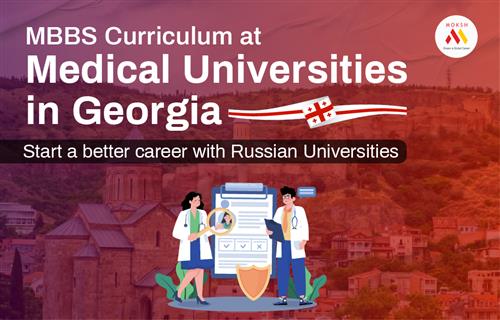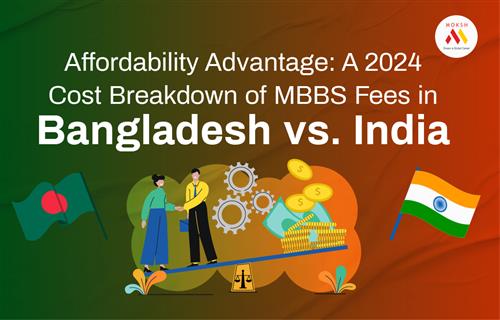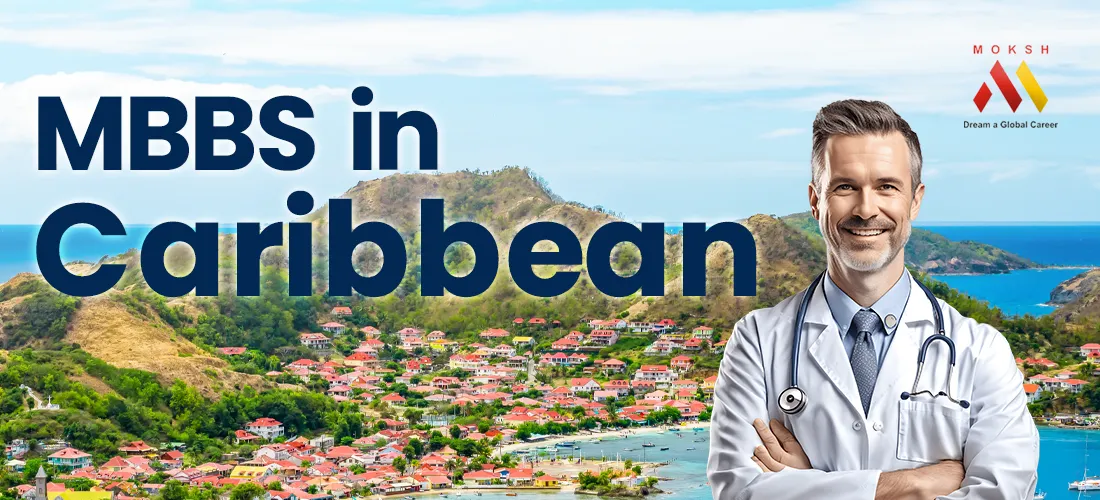
Table of Content
- MBBS in Caribbean Vs MBBS in India
- Why Medicine in the Caribbean?
- Challenge to Studying Medicine at Caribbean
- Requirement for Caribbean
- Top Medical Schools in the Caribbean
- Cost for MBBS
- Financing of your Tuition Fee
The United States currently needs more doctors. According to the US Medical Schools Association, the US will need closer to 1 Lac doctor by 2033. International Students looking for direct Admission to mainland US medical schools receive only rejection letters from US medical schools.
MBBS in the Caribbean started gaining popularity in 2016 when Indian students looking at the US as an option for their Medicine Program found it extremely difficult to get admission to US Medical Schools directly and started exploring alternative routes. Caribbean medical schools attract these students as an alternative route to US Med Schools at first glance but comes with many challenges
There are 31 Med Schools on Caribbean islands, which you can consider to study medicine in the Caribbean, looking at the reputation and cost of the respective Schools.
MBBS in Caribbean Vs MBBS in India
Med Schools in Caribbean follow a different education system than Indian system of Medical education. Refer to the table below to understand the critical differences between MBBS in India and MBBS in Caribbean on a critical parameter.
| Parameter | India | Caribbean islands |
|---|---|---|
| Med Schools | 706 | 31 |
| College Type | Pub & Pvt | Pvt |
| MBBS seats | 1.04 Lacs | 3500+ |
| Tuition Fee for the course | Pub 1-3 Lac , Pvt 60 Lac to 1.5 Cr | 1 - 3 Cr |
| Duration | 4.5+1 Yr. | 5 Yrs. |
| Infrastructure | Good to Below Avg | Very poor to Good |
| Degree Awarded | MBBS | MD |
| Medium of Instruction | English | English |
| Study Pattern | Pre-1 Yr. Para 1.5 Yr. Clinical 2 Yr. |
Pre 1 Yr. Para -2 Yr. Clinical 2 Yr. |
| Internship | 1 Year | 2 Years |
| Subjects in MBBS | 19 Subjects | 40+ Subjects |

Why Study Medicine in the Caribbean?
Studying Medicine in the Caribbean to get international exposure and a pathway to enter the US healthcare is a good idea. A few benefits of studying Medicine in the Caribbean are listed below:
Multiple Intake Options to start your Medicine as Some Caribbean Medical Schools offer rolling admissions Easy entry to Med School compared to the US and Canada.
No Entrance Exam: Like many Caribbean Med Schools, don't ask for the MCAT, UCAT or BMAT Scores.
Shorter Duration of the Program for International Students in comparison to the Actual US. Program, an Indian Student can start their Medicine just after 10+2 and complete 5 Years of BS/MD program in the Caribbean cum US. and then begin their residency program in the US.
The cost of an MD is lower than that of the US. Private medical schools, which are approx. 3.5 Lacs USD, which is not affordable for many. Caribbean, you can do the same program from 1.5 Lacs USD onward. Moreover, the cost of living is also significantly lower in the Caribbean than in the US
Scholarship opportunities help students who need financial assistance to complete the program.

Challenge to Studying Medicine at Caribbean
Studying Medicine in Caribbean Schools is not a good experience for many; only some medical schools in the Caribbean are worth studying. Many students, after completing Basic Science (BS) from Caribbean Med schools, face rejection from schools in the US or Canada, and the reasons are
Lack of Quality Education: All Caribbean medical schools do not offer the Quality of education you are expecting from them; this is because of the shortage of faculties; when the student's enrolment in any Caribbean Med Univ drops, they start removing the faculties to save the cost which leads to poor Quality of education.
Accreditation: This is the biggest problem in medical schools in the Caribbean, as most medical schools' status is either provision / withdrawal / not approved. You can check this on the CAAM-HP website.
Poor Residency Match: Many Caribbean Med Schools publish their USMLE Passing ratio, not the Residency match ratio, to mislead the students. Passing USMLE is good enough to secure your clinical rotations in the US. In contrast, Residency matches ensure your Medical PG in USA, your ultimate goal to enrol in a Caribbean Med School! The Residency match ratio is 15- 20% for most Caribbean Med Schools except for top-ranked Caribbean Med Schools. Suppose you are admitted to any Caribbean Med School except the few Best Med Schools in the Caribbean. In that case, you may pass the USMLE exam with an average score and not be able to match for the residency. It means the door to practice in the US is closed. The only option for you is to stay & practice on that particular Caribbean island, where there is hardly any requirement for a doctor as they are at par with very small towns in India. You land up nowhere after spending 5 precious years of your life and Crores of hard-earned money.
Lack of Clinical exposure: All Caribbean islands are tiny in size and Population, which leads to minimal opportunity for patient interaction. Most Caribbean countries have hospitals with I.PD patient beds of 20-100, like nursing homes in India. It means hardly any exposure to clinical in the Caribbean.
Non-recognition of the Caribbean MD program in India
The biggest problem for Indians planning to study in Caribbean Med Schools is the Non-Recognition of MBBS from the Caribbean in India by NMC as it violates the NMC rule for MBBS Abroad due to studying in two campuses and duration is less than the 5-1/2 year. After completing an MD from Caribbean Med School, You cannot practice in India.
So, pick either of the top medical schools in the Caribbean (Budget of 2.5 Cr+) or consider something other than the Caribbean Med Schools. Explore alternative options in a 1 Cr budget in Europe.
Requirement to get into Caribbean Med School
The entrance requirements for Caribbean medical schools are comparatively more flexible than Medicine programs in the US. These schools typically seek similar application components as those in the US and Canada but lower minimum score prerequisites for GPA.
Standard Caribbean medical school requirements commonly include:
- Completing an undergraduate or Bachelor's degree in Physics, Mathematics, Chemistry, and Biology.
- Minimum GPA of 3.0.
- Submission of two Letters of Recommendation (LoR).
- Personal statement.
- Successful completion of a personal interview.
- MCAT/UKCAT/GAMSAT or other standardized test scores
- English language proficiency score (Minimum 7 overall, Minimum 6.5 in each section)
Only Top Ranked Med Schools in the Caribbean seek this
Top Medical Schools in the Caribbean
Though there are 31 Med Schools in the Caribbean islands, only a few are recognized for their Quality of education; you can consider the Med Schools below as the Best Caribbean Med Schools
- American University of Antigua College of Medicine in Antigua (AUA)
- SABA University in Saba
- St. George’s University in Grenada (SGU)
- Ross University, Barbados
- American University of the Caribbean School of Medicine, St Maarten (AUC)
- American University of Antigua AUA
1. SABA University, Saba
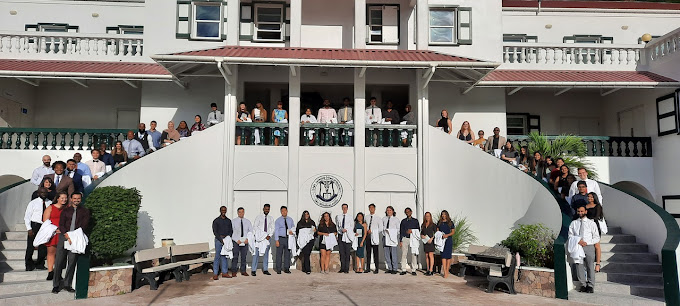
SABA University School of Medicine, a renowned global medical institution boasting over three decades of prominence, educates outstanding medical practitioners. Beginning with a twenty-month tenure on the tranquil and unspoiled Caribbean island of Saba, students progress to clinical training at esteemed teaching hospitals in the United States and Canada. Embrace membership in a welcoming and diverse community, receive tailored guidance within our deliberately small class environments, and avail yourself of an array of resources including mentorship, counselling, wellness programs, and academic assistance facilitated by our Student Support Services and Learning Centre

2. St. George’s University School of Medicine, Grenada
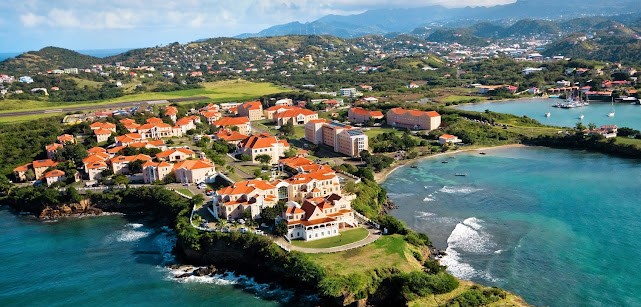
Established in 1976 as an independent institution, it has contributed highly trained doctors globally for over 45 years. Pioneering international medical education, in 2023, more than 1000 SGU Graduates, the highest in the world, from a non-Mainland US Campus were matched for US residencies. Over 20,000 physicians from over 150 countries have emerged from SGU with a unique opportunity to begin medical education in Grenada or the U.K. and complete clinical rotations in 80+ affiliated hospitals across the US, Canada and the U.K.
The SGU School of Medicine, Grenada offers a 4-year Doctor of Medicine degree for Bachelor's degree holders. It provides 5, 6, and 7 year Medical Degree Pathways for 10-2 Students with insufficient grades as foundation classes. Noteworthy facts about St. George's University include being the US's largest licensed physician provider. SGU admits students on a rolling basis, with classes commencing in August, January, and April, and also offers a U.K. Pathway starting in January or September. Indian Students prefer 1 Year Program in India and subsequent years in US or UK.
3. Ross University School of Medicine
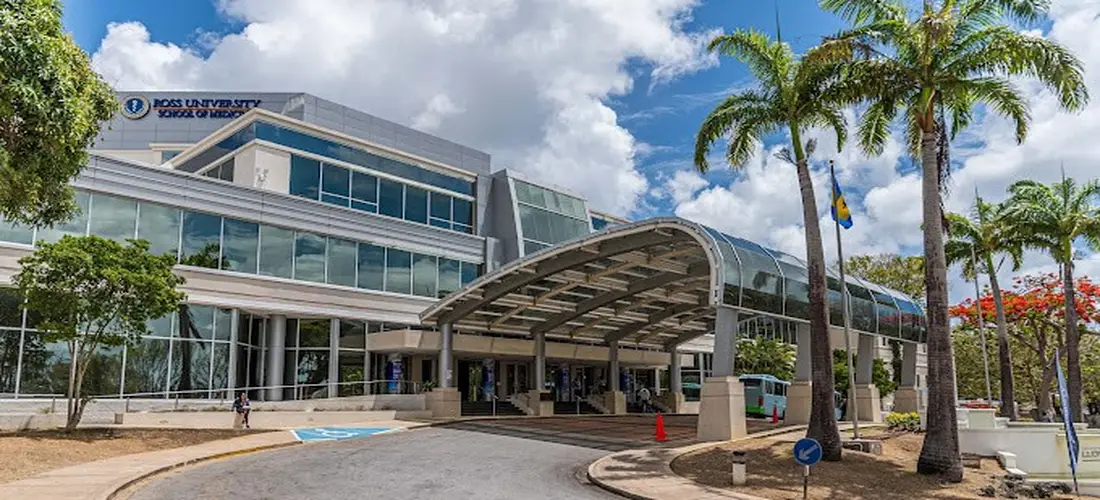
The curriculum at Ross Medical School aims to equip its graduates for professional practice in both the U.S. and Canada. Students at Ross undergo a comprehensive medical education, engaging in early practical experiences within the Barbados community before proceeding to clinical rotations and residency programs in the U.S. Those seeking to acquire the practical skills and knowledge necessary to create a significant healthcare difference in the U.S., Canada, or overseas will find Ross as the ideal destination to learn the practice of medicine.
4. American University of the Caribbean School of Medicine
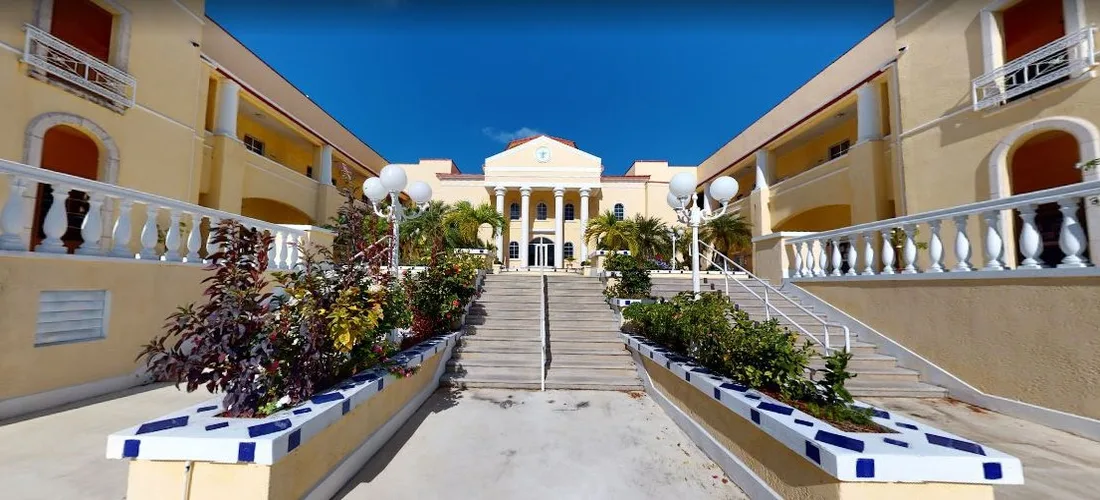
Graduates of AUC, St Maarten emerge equipped with empathy and skills to cater to diverse communities. After completing the medical sciences curriculum in St. Maarten, students undertake clinical training in the US or the UK. AUC has facilitated the journey of over 7,500 graduates practising in various specialities across the United States, Canada and the U.K.
The AUC program spans 4 years, encompassing medical sciences in St. Maarten or the United Kingdom campus and USMLE for 2 years, followed by clinical sciences, including clinical rotations in the US and U.K., alongside USMLE 2, also spanning 2 years.
5. American University of Antigua College of Medicine
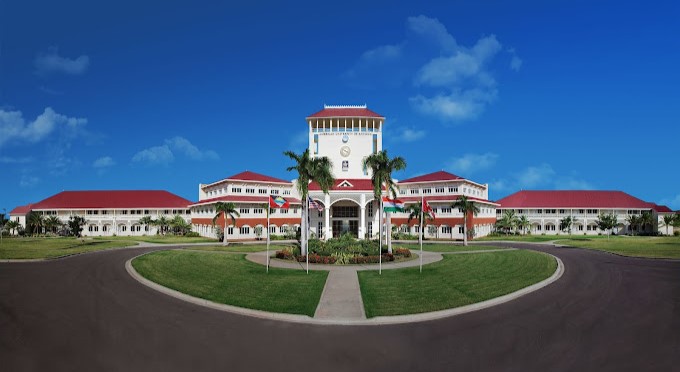
Graduates from AUA Antigua can get licensure in all 50 US states, Canada, and the UK. AUA boasts a curriculum emphasizing small class sizes with a 10:1 student-to-faculty ratio during the initial academic period, transitioning to a 20:1 ratio for the remaining Pre-Clinical Sciences curriculum. Its educational structure is on par with the US, Canada & the UK while maintaining a nurturing and supportive atmosphere. The AUA School facilitates clinical placements in the US, Canada, the UK, and beyond. Also, it offers the option to start Basic Science studies at AUA and transfer to Warwick Medical School, USA, for the degree.
AUA Antigua follows an innovative 4.5-year M.D. program covering:
- Pre-Clinical Sciences on the AUA campus in Antigua - 2 years.
- Pre-Clinical Science Integrated Course intersession at the AUA campus in Antigua - 13 weeks, followed by the USMLE Step I examination.
- Clinical Sciences comprising 84 weeks of Core and Electives clinical clerkships at affiliated teaching hospitals in the US. Additionally, eligible students can pursue elective rotations in the US, Canada & the UK.



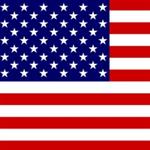
-1.jpg)

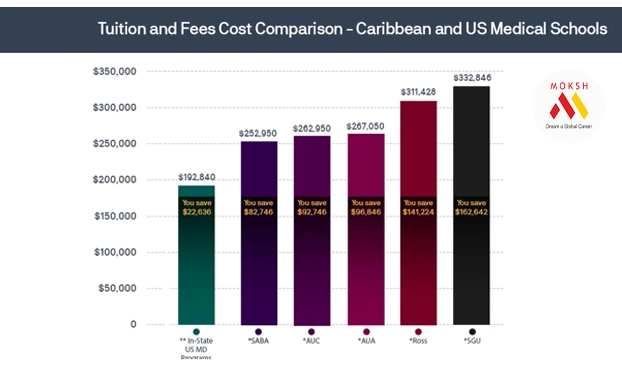



.png)

